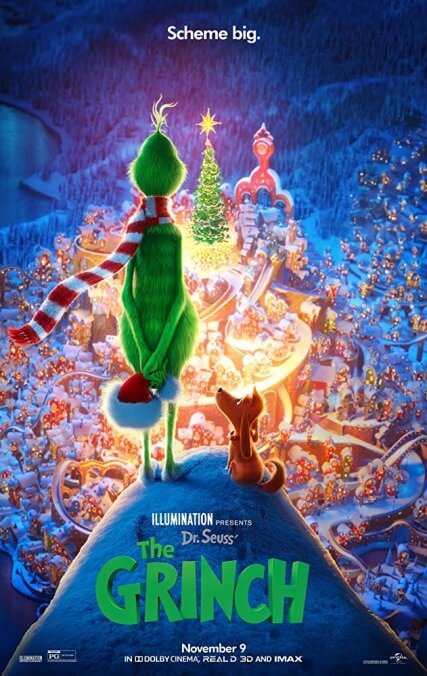You’re a dull one, Mr. Grinch—at least in this latest retelling of the classic Seuss tale

If Walt Disney Animation built its reputation on fairy tales and princesses, is upstart animation house Illumination founded on supervillains? Four of its first eight cartoons are part of the Despicable Me family, detailing the adventures of a bad guy (reformed by his adoption of three girls) and his chattering minions (reformed, in a sense, by their goofball incompetence). Now the company has taken on the Dr. Seuss classic How The Grinch Stole Christmas, expanded in story but shortened in title to simply The Grinch. It’s another movie focusing on a character who drips with self-regarding (and child-fascinating) malevolence and who, like Despicable Me’s Gru, lets go of his evil ways rather easily.
The Grinch is only the third major adaptation of the Seuss book, coming along nearly 20 years after the last one. But because the initial 26-minute animated version is a holiday perennial made for television, the notion of remaking the story feels especially redundant. Illumination’s Grinch doesn’t distort the original, like Ron Howard’s garish eyesore of a live-action version. Nor does it put that story through an embarrassing process of faux-modernization, though there is a mirthless gag involving the Grinch wearing booty shorts and some particularly lazy, Sing-worthy song cues. (Finally, a Seuss adaptation with a snatch of “Mambo No. 5”!) If anything, this is a more meager, timid iteration of Seuss’ story, starting with the characterization of its famous antihero.
The Grinch (Benedict Cumberbatch) still lives in a mountainous cave overlooking cheery, Christmas-loving Whoville, seething with irritation as they tee up their lavish celebration, and still underappreciates his loyal, beleaguered dog, Max. But despite Cumberbatch’s ability to radiate low-toned contempt, his flatly American-accented Grinch voice goes nasal with sarcastic complaints, as if doing a vague, less-gruff impression of live-action Grinch Jim Carrey. This Grinch barely registers as an outcast, as he reluctantly tromps into Whoville to go grocery shopping when necessary, even cringing through what seems like regular if unwanted conversation with a particularly jolly Who (Kenan Thompson, a minor delight). Throughout it all, Cumberbatch never summons a tone of mystery or otherworldliness. He’s the Grinch as a sitcom’s cranky upstairs neighbor.
It doesn’t help that the filmmakers (who include, weirdly, longtime Kevin Smith producer Scott Mosier) are all too eager to tip their hands about the Grinch’s appended backstory. This material is less egregious than the 2000 version but still dispiritingly rote: Why, perhaps the Grinch hates Christmas because he… had a sad Christmas experience as a child?! Granted, the Grinch’s secret pain provides a lesson in empathy for the littlest viewers (never too early to learn some dime-store psychology!), and the movie presumably has to do something to pad a 64-page-book-turned-26-minute-cartoon into 80 minutes or so of movie. Those demands explain the numerous slapsticky vignettes of the Grinch preparing his big Christmas heist, and a subplot about Cindy Lou Who (Cameron Seely) setting a trap for Santa so she can talk to him directly about getting some help for her single mom (Rashida Jones). Do even preschoolers require this much emotional nudging? At least Pharrell Williams provides some unforced warmth as the story’s narrator.
This is Illumination’s second crack at Seuss following The Lorax, which may not have been much good but did offer a credibly three-dimensional version of Seuss’ imagery. Arriving six years later, The Grinch gets closest to Seuss, Chuck Jones, or just the bouncy invention of a pretty good big-studio cartoon with the actual Christmas-stealing sequence, piled high with cartoon physics and Grinch-y gadgetry, and augmented with split-screen. The rest of the time, the animation just rounds off the scruffiness of the original illustrations. It’s enough to make an older viewer long for something more grotesque to stick its ugly head into the proceedings. The overblown Howard/Carrey version of the story failed more ostentatiously, but frankly, it was more interesting to look at, in all its overdesigned glory. Illumination’s focus on cartoon villainy should set it apart. But by this point, the filmmakers have softened the very concept of “bad” into just another bowl of brightly colored sugary mush.